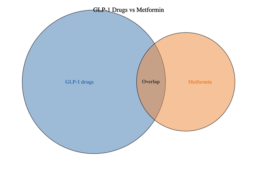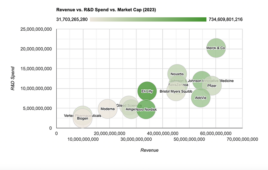 Lilly’s hot weight loss drug Zepbound (tirzepatide) may be one of the most effective drug therapies for weight loss. In an open-label 36-week study, participants lost an average of 20.9% of their body weight in 36 weeks. With an average weight of 107.3 kg (236.5 lbs), that equates to about 22.4 kg (49.4 lbs) on average.
Lilly’s hot weight loss drug Zepbound (tirzepatide) may be one of the most effective drug therapies for weight loss. In an open-label 36-week study, participants lost an average of 20.9% of their body weight in 36 weeks. With an average weight of 107.3 kg (236.5 lbs), that equates to about 22.4 kg (49.4 lbs) on average.
Weight regain a risk for those going off Zepbound
The catch, however, is that participants needed to keep taking the drug to keep losing weight. Those who stopped taking it saw a rebound, regaining about half of what was lost in the 52-week period after the initial 36-week study. But those who kept taking tirzepatide continued losing weight — an additional 5.5% reduction from week 36 to week 88, according to a review of the SURMOUNT-4 study published in JAMA.
In general, significant weight loss followed be regain can be more than an inconvenience. A Journal of Clinical Endocrinology and Metabolism 16-year prospective cohort study looking at patients with type 2 diabetes found such fluctuations to be linked to higher mortality.
In the SURMOUNT-4 trial, participants initially treated with tirzepatide for 36 weeks started with an average weight of 107.3 kg (236.55 lbs). After 36 weeks, they experienced an average weight reduction of 20.9%, dropping to roughly 84.87 kg (187.17 lbs). At week 36, some were switched to a placebo, and by week 88, this group’s average weight increased by 14%. By week 88, participants who continued with tirzepatide after the initial 36 weeks maintained a reduced average weight. But those who switched to placebo saw an average weight increase of 14%. While 89.5% of those who received tirzepatide throughout the study period retained at least 80% of their initial weight loss, the data suggests that efficacy may be highest in the initial treatment phase.
The most common side effects were gastrointestinal in nature, as other prior studies of GLP-1 drugs have found. Most side effects, however, were mild.
Another takeaway from the study is that participants also saw improvements in metrics such as blood sugar and cholesterol.
At 88 weeks, 25.3% weight reduction
At the end of the study, tirzepatide recipients saw a mean weight drop of 25.3% while placebo recipients lost 9.9% of their weight. Of those who continued taking tirzepatide for the full 88 weeks, 89.5% were able to maintain at least 80% of the weight loss they achieved during the initial 36-week period. Conversely, only 16.6 % of participants in the placebo arm met the same benchmark.
Zepbound has a list price of approximately $1,060 per month and payers may warm to covering GLP-1 therapies for non-diabetic individuals given their potential to also improve cardiometabolic health. While Medicare prescription drug plans (Part D) generally don’t cover Zepbound, which won approval for obesity in November, the therapy was added to the National Preferred Formulary for Express Scripts and Cigna Healthcare, as well as Cigna’s commercial formularies.
Additionally, Lilly has offered a savings card program making the therapy more affordable for those with private insurance.
More data needed on long-term use
One wild card that could affect long-term adoption of drugs like Zebpound is the fact that their impact on overall health is not fully understood. While GLP-1 therapies offer significant short-term weight loss benefits, more data are needed to shed light on the potential long-term complications tied to the therapies. For example, in animal studies, tirzepatide was linked to thyroid C-cell tumors in rats, but studies have to date not uncovered a similar risk in humans.
Additionally, some evidence suggests that the body may adjust its hormonal responses over time in response to GLP-1 therapies, countering the effects of the medication. Hormones like leptin, which suppresses hunger, may decrease over time, while ghrelin, which stimulates appetite, may increase. This fact could explain why about 1 in 10 people who continued on Zepbound in SURMOUNT-4 were unable to maintain at least 80% of their weight loss after a year and began to regain weight, even while taking the drug.
Filed Under: clinical trials, Drug Discovery, Gastroenterology, Metabolic disease/endicrinology



